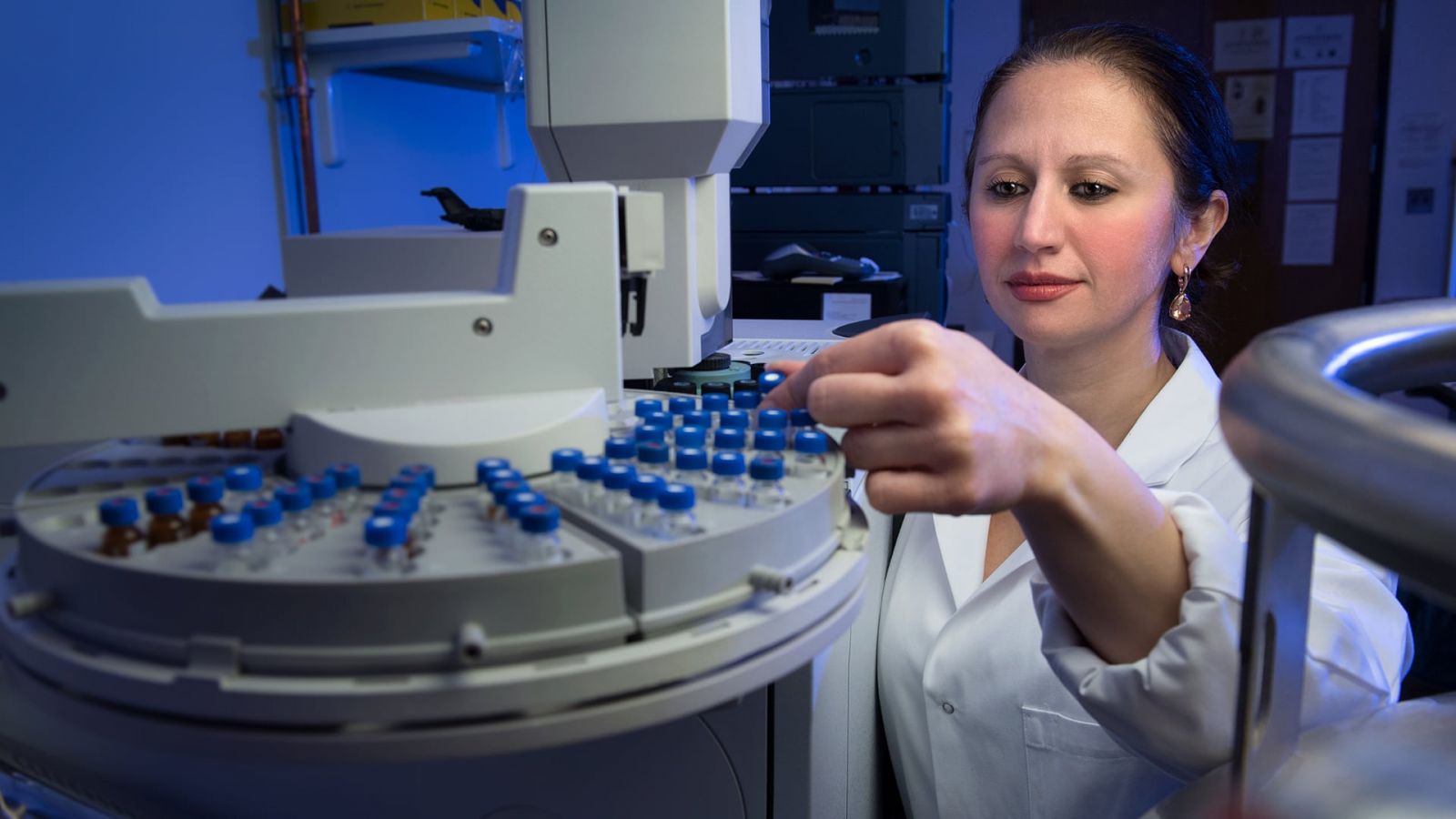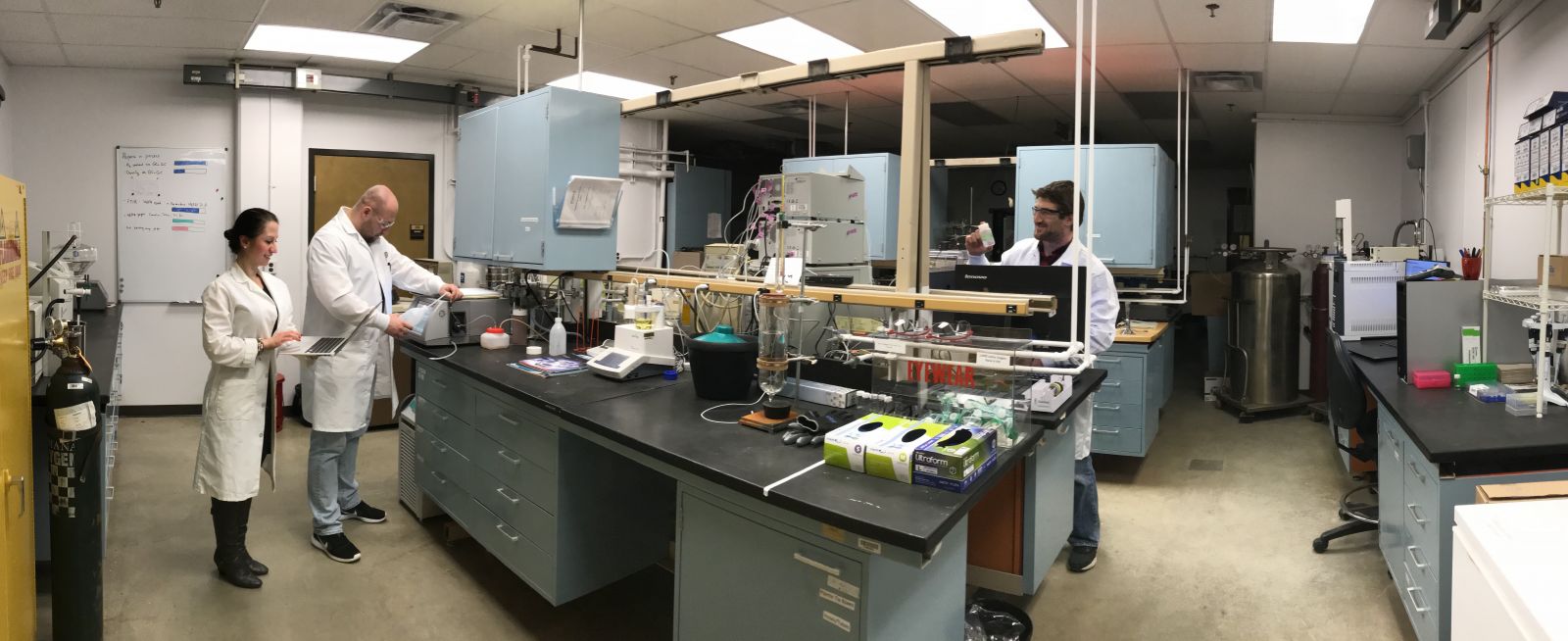
A new grant from the U.S. Department of Energy (DOE) will accelerate research by the Purdue Polytechnic Institute toward generating sustainable aviation fuels. The $1.7 million grant was awarded to Gozdem Kilaz, assistant professor of engineering technology and director of Purdue’s Fuel Laboratory of Renewable Energy (FLORE).
Kilaz will serve as principal investigator for the project titled “Higher Energy-Content Jet Blending Components Derived from Ethanol.” The research team includes John Sutherland, professor and Fehsenfeld Family Head of Environmental and Ecological Engineering; Nathan Mosier, professor of agricultural and biological engineering; Hilkka Kenttämaa, the Frank Brown Distinguished Professor of Chemistry; and Rodney Trice, professor of materials engineering. They are collaborating with researchers at the Pacific Northwest National Laboratory (PNNL) and LanzaTech, an Illinois-based producer of sustainable aviation fuels.
LanzaTech and PNNL have already demonstrated methods for creating jet fuel components from non-petroleum sources such as organic matter, or biomass, and waste. But it remains challenging for the industry to produce aviation biofuels in an economical manner, according to the researchers.
Specific chemical properties in jet fuel serve as proxies for real-world performance and operability, but gaps remain in the industry’s understanding of the properties and performance of some of the components of jet fuel mixtures. For the DOE-sponsored research, Kilaz and her colleagues will analyze the chemical properties of fuel samples, providing a “feedback loop” that will help close the gaps in understanding of how the chemistry of specific fuel mixtures affects performance and operability when fuels are used in industry. They will also examine the economic, ecological and societal parameters associated with deploying sustainable fuel technology in the United States.
Combining Purdue’s abilities to analyze the chemical properties of fuels with PNNL’s strengths in process development could lead to an economically attractive process for manufacturing sustainable jet fuel. During the three-year project, they hope to produce an alternative aviation fuel that has higher energy content and less emissions-generating constituents than comparable petroleum-based fuel, said Kilaz.
The research could also help ASTM International, the organization that produces standards for civilian fuel types, implement chemistry-based methodology for certifying new jet fuel mixtures. Such methodology would provide incentives for other organizations to produce other candidate biofuels and lower the overall cost of achieving sustainable skies, Kilaz said.
The right blend of engineering skills
Kilaz’ unique educational background makes her well-suited to research in alternative fuels. After earning a bachelor’s degree, a master’s degree and a doctorate in chemical engineering, Kilaz pursued postdoctoral research in mechanical engineering technology before joining Purdue Polytechnic’s faculty.
“We are always advancing the interface between science and technology through multidisciplinary projects,” Kilaz said. “Instead of seeing my background in chemical engineering as a difference, I used it as an advantage. I wanted to see how we could make a synthesis, utilizing the main principles of both mechanical and chemical engineering while also collaborating with faculty in materials engineering and chemistry.”
By blending the disciplines, Kilaz has been able to focus research on the development of alternative liquid fuels for transportation — specifically, biofuel for aviation.
“When we utilize alternative fuels, we introduce fewer toxins into the environment than when we use petroleum-derived fuels,” said Kilaz. “It’s important to note that the resources [for biofuels] are never going to diminish. We can always grow more plants and dedicate more biomass toward energy production.”
Greenhouse gasses in the atmosphere would be reduced through greater cultivation of biomass for alternative fuels, noted Kilaz, because plants use carbon dioxide as food for photosynthesis. She imagines a “closed cycle” in which carbon dioxide emissions from the combustion of fuel are fully consumed by the plants grown to produce those fuels.
“The optimal solution for an environmental engineer,” said Kilaz, “is to be carbon-neutral, leaving a cleaner, more sustainable future to the next generation.”

Chemistry meets engineering technology meets aviation technology
“Aviation is one of the most amazing, attractive industries,” said Kilaz, who has appointments both the School of Engineering Technology and the School of Aviation and Transportation Technology. “The more global the world becomes, the more interest there will be in aviation. Aircraft emissions happen at high altitudes, unlike other forms of transportation. It’s a unique, vast problem.”
Working with aviation fuels is especially interesting to Kilaz. In ground vehicles, gasoline or diesel fuel provides energy for propulsion, but oil is used for lubrication. In aviation, fuel is used for propulsion, lubrication and cooling, so Kilaz said its properties and behavior are even more important to the overall operation of aircraft engines.
“There is a lot of caution when approving a new candidate aviation fuel,” she said. “The process is much more demanding, cumbersome and expensive. If we need to tackle one specific subject in the study of alternative liquid transportation fuels, I think it needs to be aviation fuel.”
Similar analyses of the chemistry of fuels is helping other research efforts
Kilaz is also leading efforts to optimize a new chemical conversion process for the production of aviation biofuel from plastic waste. The chemical conversion process was invented by Linda Wang, the Maxine Spencer Nichols Professor in the Davidson School of Chemical Engineering, and her research team.
Using comprehensive two-dimensional gas chromatography, Kilaz and FLORE researchers are studying the chemical composition of converted polyolefin waste products produced by Wang’s team. The FLORE team is cataloging the specific properties of those waste products, and working to ensure the correlations between the products’ chemistry and properties are more thoroughly understood. Improved understanding of waste’s chemical properties will help ready them for conversion in into fuel, Kilaz said.
Student involvement in use-inspired research
Kilaz first revealed the $1.7 million DOE grant in an appearance on “Techies Today,” the Purdue Polytechnic podcast. In the podcast, Kilaz also discussed the importance of using Purdue’s FLORE facility to provide both graduate and undergraduate students with opportunities to participate in “use-inspired research,” which connects the acquisition of scientific knowledge to applications that are useful in “everyday life.”
“The younger we get our engineers and technologists interested in use-inspired research, the more productive a future we will enable,” said Kilaz.
For more information about the new podcast, see polytechnic.purdue.edu/techiestoday.
Additional information:
- Higher Energy-Content Jet Blending Components Derived from Ethanol (Dept. of Energy)
- Researchers explore converting plastic waste into clean fuels, other useful products
- Kilaz’s new Fuel Laboratory of Renewable Energy already making mark in interdisciplinary research
- Making a difference for the future: Purdue professor focuses on improving sustainability with jet fuel research (Purdue News)
- Fuel Laboratory of Renewable Energy (FLORE)
- Audio podcast: Techies Today Episode 003: Gozdem Kilaz – Jet Fuel from Plastic Waste?
- Video: Gozdem Kilaz, Jet Fuel from Plastic Waste? – Techies Today 003 (YouTube)
- Techies Today, the Purdue Polytechnic Podcast
